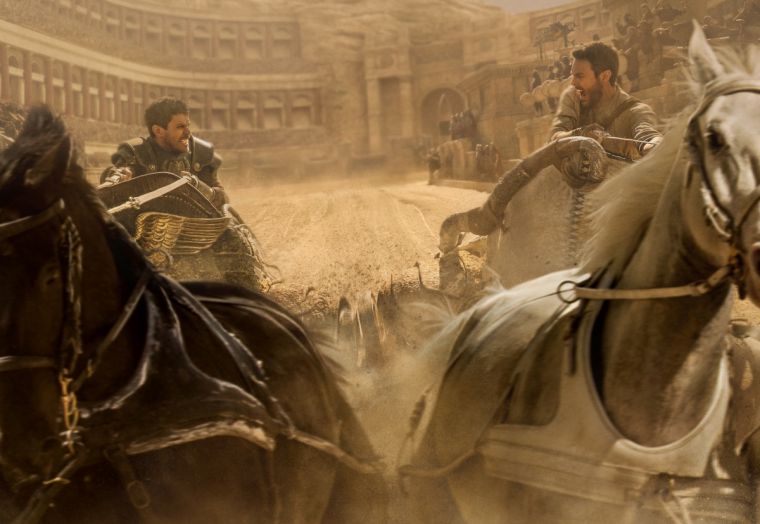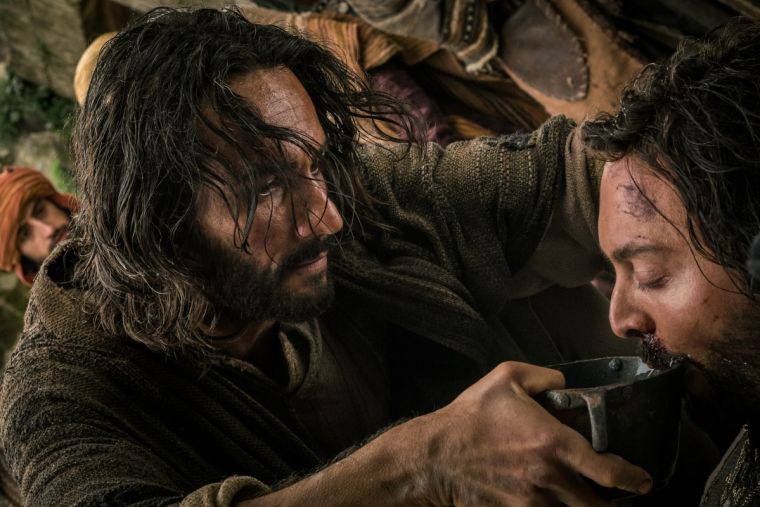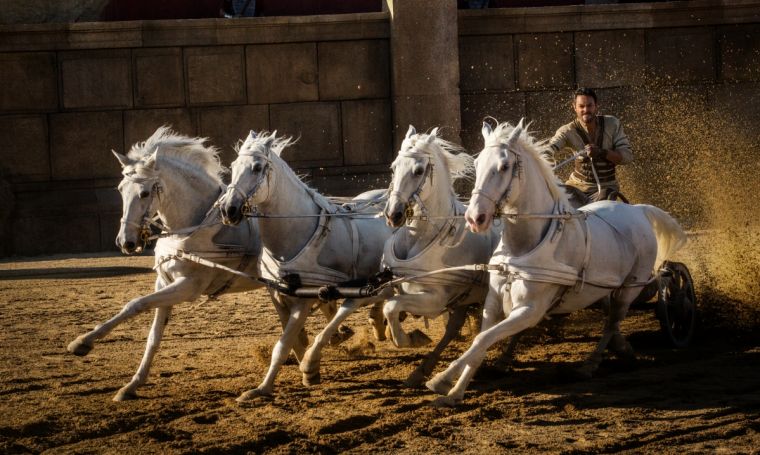Ben-Hur: A classic tale revisited, but can it please both faith and secular audiences?

Standing in a catering tent on the outskirts of Rome while a couple of hundred Roman soldiers file in is an unusual experience. Watching a centurion eat pasta salad isn't something you forget very easily.
The set of Ben-Hur, out on Friday in the US and in the UK September 7, was phenomenal. After being banned from filming in Rome's Circus Maximus, an enormous replica was built from scratch to host the iconic racing scene, complete with more than 80 horses and 30 chariots. A slave ship dominated the lot in Cinecittà, a huge film studio that has famously hosted the productions of a number of blockbusters including Quo Vadis, Roman Holiday and Cleopatra, making the sheer scale of Paramount's latest undertaking impossible to ignore. The $100 million dollar production is taking on Lew Wallace's 1880 epic novel; the story of Judah Ben-Hur's quest for revenge against his nemesis, and childhood friend, Messala. Subtitled 'A tale of the Christ' and set in the time of Jesus' ministry, it's a story of one man's encounter with the Messiah, and the impact it – or, rather, He – has on his life.
It's being touted as a remake of the 1959 classic starring Charlton Heston, but those behind Ben-Hur insist that's a misleading characterisation. It's a whole new film, producer Duncan Henderson (Dead Poet's Society; Harry Potter and the Philosopher's Stone) tells Christian Today. There's a nod to earlier adaptations – including the 1925 silent film – but the script writers went back to the original source material to find a different narrative.
"There's a lot of material in the book, so you don't have to mine exactly the same story," Henderson explains. "There's obviously big themes there that we go back to; it's a story of friendship, betrayal, revenge and forgiveness. Those are big, big issues in the story and pretty much every Ben-Hur that you would see would have those elements in it. But how you put those together, how you structure those, are different."
Taking on a well-loved classic is a huge task, especially when predecessors have gained as much traction as Heston's Ben-Hur, which won an unprecedented 11 Oscars in 1960. The production team might protest, but their new blockbuster will no doubt be compared to those that came before it. Added pressure will come from its attempt to tackle biblical themes; few have enjoyed the popularity of Mel Gibson's Passion of the Christ – still the highest grossing non-English-language film of all time – despite a slew of recent films attempting to do so.
Each biblical epic to have hit the silver screen in the past couple of years seems to have missed the mark in some way. Darren Aronofsky's Noah was a triumph in the box office, but alienated a significant portion of its faith audience through its dark portrayal of scripture and somewhat unexpected depiction of the Nephilim, in particular. Exodus: God and Kings was also accused of deviating from the original text, and Son of God proved more popular with Christians, but generally received negative reviews. With this legacy behind it, can Ben-Hur deliver on its promise to bring both secular and faith audiences together?
'We are not doing Noah'
Henderson's co-producers, including Sean Daniel (famously of The Mummy trilogy) and The Bible and AD: The Bible Continues' husband and wife team Mark Burnett and Roma Downey, are adamant that their creation will appeal to a wide range of people. "We really believe that we are making a film that will be a powerful, authentic, epic and moving experience for people of faith [and] for moviegoers of all kinds," Daniel explains. "I guess it sounds like a grand claim, but... I will tell you: we are truly not doing Noah."
They believe that the new Ben-Hur will speak to its own period of time in a fresh way, and even bring revelation of grace to a new audience. The portrayal of Jesus in particular, played by 300's Rodrigo Santoro, will deliberately be entirely different to previous productions. When the novel was first dramatised on stage in 1899, Wallace agreed only on the grounds that Jesus be represented by a beam of light, rather than an actor. Claude Heater's role as the Messiah in the 1959 epic went uncredited, and his face was never shown to the camera. "He [Jesus] is about as mysterious as he could possibly be," Henderson says of Heater's portrayal.
The 2016 epic takes another direction. Santoro enters as a carpenter, and the film discreetly follows the growth of Jesus' following. It isn't really 'A tale of the Christ' at all, but the impact of Jesus' earthly ministry on the lives of the protagonists is woven in through the narrative. "It's just a different way of telling the story," Henderson reflects. "It's done very delicately... there's a subtly to it."
A graceful encounter

It is this subtlety that could prove popular with a secular audience; films such as God's Not Dead and its sequel have proved that viewers do not typically respond well to a film with an overt Christian agenda. But there is a hope, certainly from Burnett and Downey, that audiences will be compelled by the portrayal of Jesus, nonetheless. "There is an opportunity for this story to meet a great new audience and to be told in a way that's updated," Downey tells Christian Today. "It's gritty and it's dangerous... it's redemptive and it's beautiful, because at the heartbeat of the story is Judah's encounter with Jesus and how it ultimately transforms his life."
Downey is evidently passionate about making the biblical narrative accessible to a wider audience. "Regardless of your faith there's no way you will sit through this movie and not experience the grace that this encounter provides, so I find that deeply encouraging," she says. She and the other producers have worked closely with faith advisors to ensure the film is "in tune with the essence of the Word" and insist they haven't taken any liberties with the text. Ben-Hur is famous for its chariot race, but perhaps the most monumental scene from a faith perspective occurs towards the end of the film when Jesus is crucified; a moment that numerous crew members recalled as deeply moving.
"It was a day none of us will forget," Daniel says. "It was incredibly intense for the actors, and we think something really very powerful happened." Filmed on a freezing cold day in the Cinque Terre on the Italian Riviera, Santoro was in makeup for five or six hours to prepare for the scene. Henderson recalls it being an emotional day for the whole crew, and vital to the narrative of Wallace's story. It is at the foot of the cross that Judah Ben-Hur, played by Jack Huston, is converted, and his journey towards forgiveness begins.
"In this movie Jesus' presence, it's essential, and it's because of the encounter with Jesus that Judah has an awakening," Downey says. "The work filmed that day is extraordinarily central to the themes of the film."
Sincere faith cloaked in epic action

The binding together of secular and faith interests in one film is in some ways a pleasing reflection of Wallace's personal journey towards Jesus; he became a Christian while researching and writing the novel. The author said he "had no convictions about God or Christ" and was not "in the least influenced by religious sentiment" prior to penning his masterpiece, but later acknowledged in his 1906 autobiography: "I believe absolutely in the Christian conception of God".
His great-great-granddaughter, Carol Wallace Hamlin, says the book was partly so successful because "it was so sincere".
"He [Wallace] did have a big faith experience while he was writing. He knew what he was talking about," she explains. She also said that seeing the novel come to life in a new film had been an "expansive experience" in terms of her own faith – something the film's producers no doubt hope will be replicated for the millions who are expected flock to cinemas in the coming weeks.
With a multi-million dollar budget and some big-name actors – Morgan Freeman plays Arab Sheik Ilderim, Toby Kebbell is Messala and Judah's love interest, Esther, has been taken on by Iranian actress Nazanin Boniadi – no expense has been spared to ensure the epic lives up to its reputation. The gentle narrative of a transformative encounter with Jesus is "cloaked in this big epic action movie," Downey says.
"I think that the audience will come because it has all the ingredients of a big epic, big budget, studio film, but there's this heartbeat of forgiveness, and a heartbeat of the possibility of redemption through an encounter of Jesus... and it's profoundly moving," she says.
It remains to be seen if Downey's prediction will come true, but by playing up Jesus' role in the film, it's certainly got a Bible-belt audience in its sights.











